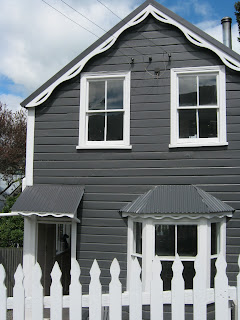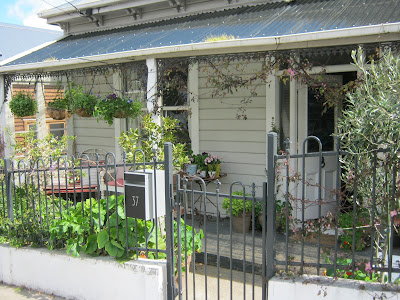Interior of St Saviours Church, Lyttelton
 I went over to Lyttelton today to see this church (part of our Heritage Week celebrations). Lyttelton is the port town of Christchurch, accessed through a long road tunnel built through the remains of an old volcanic caldera. It has a special place in my heart because I was born there, and lived there for the first six years of my life. It has a very different feel from Christchurch, enclosed and hilly as opposed to flat and open. It was one of the first towns established by the European settlers, and was a major entry port for immigrants, who then trudged wearily over the hills to Christchurch.
I went over to Lyttelton today to see this church (part of our Heritage Week celebrations). Lyttelton is the port town of Christchurch, accessed through a long road tunnel built through the remains of an old volcanic caldera. It has a special place in my heart because I was born there, and lived there for the first six years of my life. It has a very different feel from Christchurch, enclosed and hilly as opposed to flat and open. It was one of the first towns established by the European settlers, and was a major entry port for immigrants, who then trudged wearily over the hills to Christchurch.
St Saviour's church was originally sited in West Lyttelton, and its particular mission was to minister to sailors. When worship was centralised in the town at Holy Trinity, St Saviours, then surplus to requirements, was moved through to Christchurch, becoming the chapel for the Cathedral Grammar School. Now it's back in Lyttelton on the site of the Holy Trinity Church, which sadly collapsed completely during the earthquakes. The central light fitting of Holy Trinity, the Corona Lucis, has been restored and re-installed in St Saviours. The original font from Holy Trinity, where my own little baby-bald head was baptised, is also now in the church.
The restored Crown of Light
Bored choir members whiled away the sermon carving their names into the organ-front. One W. Furneaux appears twice, in 1903 and 1905.
Very pretty reredos with grape motifs
Christ calming the waters, appropriate for a seamen's church.
The vicarage was also damaged badly, but is due to be restored soon.
Many picturesque old buildings abound. The town had a serious fire in the 1880s, and much of the early commercial centre was destroyed, but there are still many residential buildings from this period and after.
The earthquakes took a big toll on the old buildings of the port town. This is one of the prettiest houses, still awaiting restoration. When I was a child an old lady called Pretoria Wern lived here, a Boer war baby judging by her name.
This is my old house. It has gone through several phases of gentrification since we lived there. I still have a brass kettle and a china wash-basin jug that my father found in the cellar. It looks romantic but was a cold dark house which got little sunlight. I hope the present owners are more comfortable in it.
The street market, London Street. Every Saturday Lyttelton has a market in the main street. Many of the old buildings here have been removed due to earthquake damage, and sad, neglected sites gape open. Lyttelton has now become a trendy place for the kind of wealthy people who can afford to look poor, and with the alternative crowd of new hippies and creative types (think Portland only a little more gritty); it used to be very working-class, with most men employed on the wharves or on the railway that serviced the port.
Old house in Winchester Street. Old cottages here are often built right on to the pavement, which looks very quaint. Many of the street-names here are English; Oxford Street, Winchester Street, London Street. Homesick settlers touchingly called dirt tracks after busy thoroughfares in their homeland. They were nothing if not optimistic!
I hope you've enjoyed this look at a bit of Lyttelton, a town well-worth visiting on a fine and sunny spring Saturday.











I did enjoy your pilgrimage home. Thank you.
ReplyDeleteWhat is it about working class towns that the very wealthy feel it essential to take them over? Gentrification has tarted up (but often not improved) some very special places.
I was reading an article a few days ago about gentrification. It's become a real social problem in the US and UK, with the poor and the working class being unable to afford to live in their own suburbs as the wealthy hipsters move in. Shops that provided services or food at low prices are being replaced by hip restaurants and cafes with wi-fi and whathaveyou. Gentrification is like a kind of reverse snobbery, rich people playing at being working class but still needing to change everything to make themselves more comfortable.
Delete